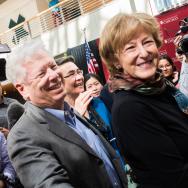Nearly two months have passed since a 4 a.m. call from Sweden changed the life of economist Richard Thaler.
That morning, Thaler called receiving the Sveriges Riksbank Prize in Economic Sciences in Memory of Alfred Nobel, the culmination of “a long journey” of scholarship. Known as one of the founding fathers of behavioral economics, Thaler, the Charles R. Walgreen Distinguished Service Professor of Behavioral Science and Economics at the University of Chicago Booth School of Business, said his field had come a long way since being “out in the wilderness” 40 years ago.
“When you’re doing research that’s a little unusual, and your approach is unusual, and you’re criticizing some of the other people in the field, you never know whether anybody’s taking it seriously,” said Thaler, who is in Stockholm, Sweden this week to receive his award.
Thaler will deliver the Nobel Prize Lecture in Economic Sciences on Dec. 8 and receive his Nobel medal on Dec. 10. (Both events will be webcast live on the Nobel website.) Thaler is the 90th scholar associated with UChicago to be awarded a Nobel Prize and sixth current member of the UChicago faculty.
“The last month has been frenetic, so I don’t know if it has sunk in,” Thaler said. “I’m not sure it will sink in until I get back from Stockholm.”
A view of the Stockholm Concert Hall, where Prof. Richard Thaler will receive his Nobel Prize medal during a Dec. 10 ceremony. (Photo by Frank Augstein/Associated Press)
‘A speech to the general public’
Author of the best-selling book Nudge, Thaler is renowned for research showing how human behavior contradicts traditional economic logic. And much like his groundbreaking scholarship, Thaler will be taking a different approach to his Nobel lecture.
Charged with delivering a 35-minute Nobel address, Thaler hopes to make it visual and “not bogged down in technical details.” Thaler knows a few things about writing a Nobel lecture, having heard five Nobel lectures in the two times he’s attended the ceremony—including 2002, when friend and former Stanford University colleague Daniel Kahneman was honored.
“Thirty-five minutes is not that long, and I don’t talk that fast. For the speech, I’m just trying to think about what is the best introduction of this material for 500 to 800 mostly Swedish residents of Stockholm,” Thaler said. “It’s not a speech to experts; it’s not a speech to my colleagues—it’s a speech to the general public.”
Thaler described the day the Nobel Prize was announced on Oct. 9 as a blur. He recalls the flood of congratulatory messages and a news conference at Booth, but also teaching a class that night at the Gleacher Center.
The work of a scholar, Nobel-winning or not, never ends. Soon after Stockholm, Thaler will return to research and tackling the task of writing a technical research paper for Nobel, due Jan. 31, which will be published in the American Economic Review.
“When you wake up in the morning, you still have to brush your teeth and take a shower—and pretty much life goes on,” Thaler said. “People have asked me: ‘Do your colleagues treat you any differently?’ No. They may have cut me slack for 10 or 15 minutes, and then it’s back to normal.”









